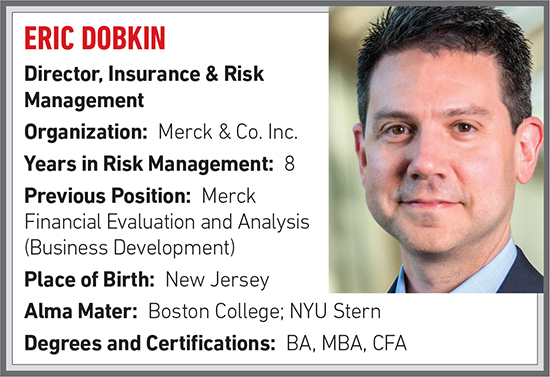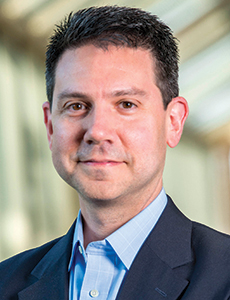The Profession
For This Pharmaceutical Risk Director, Managing Risk Means Being Part of the Mission to Save Lives
R&I: What was your first job?
My first job out of undergrad was as an actuarial trainee at Chubb.I was a math major in school, and I think the options for a math major coming out are either a teacher or an actuary, right? Anyway, I was really happy when the opportunity at Chubb presented itself. Fantastic company. I learned a lot there.
R&I: How did you come to work in risk management?
After I went back to get my MBA, I decided I wanted to work in corporate finance. When I was interviewing, one of the opportunities was with Merck. I really liked their mission, and things worked out. Given my background, they thought a good starting job would be in Merck’s risk management group. I started there, rotated through other areas within Merck finance but ultimately came back to the Insurance & Risk Management group. I guess I’m just one of those people who enjoy this type of work.
R&I: What is risk management doing right?
I think the community is doing a good job of promoting education, sharing ideas and advancing knowledge. Opportunities like this help make us all better business partners. We can take these ideas and translate them into actionable solutions to help our companies.
R&I: What could the risk management community be doing a better job of?
I think we have made good advancements in articulating the value proposition of investing in risk management, but much more can be done. Sometimes there is such a focus on delivering immediate value, such as cost savings, that risk management does not get appropriate attention (until something happens). We need to develop better tools that can reinforce that risk management is value-creating and good for operational efficiency, customers and shareholders.
R&I: What’s been the biggest change in the risk management and insurance industry since you’ve been in it?
I’d actually say there hasn’t been as much change as I would have hoped. I think the industry speaks about innovation more often than it does it. To be fair, at Merck we do have key partners that are innovators, but some in the industry are less enthusiastic to consider new approaches. I think there is a real need to find new and relevant solutions for large, complex risks.
R&I: What emerging commercial risk most concerns you?
Cyber risk. While it’s not emerging anymore, it’s evolving, dynamic and deserves the attention it gets. Merck was an early adopter of risk transfer solutions for cyber risk, and we continue to see insurance as an important component of the overall cyber risk management framework. From my perspective, this risk, more than any other, demands continuous forward-thinking to ensure we evolve solutions.
R&I: What’s the biggest challenge you’ve faced in your career?
Sticking with the cyber theme, I’d say navigating through a cyber incident is right up there. In June 2017, Merck experienced a network cyber attack that led to a disruption of its worldwide operations, including manufacturing, research and sales. It was a very challenging environment. And managing the insurance claim that resulted has been extremely complex. But at the same time, I have learned a tremendous amount in terms of how to think about the risk, enterprise resiliency and how to manage through a cyber incident.
R&I: What advice might you give to students or other aspiring risk managers?
Have strong intellectual curiosity. Always be willing to listen and learn. Ask “why?” We deal with a lot of ambiguity in our business, and the more you seek to understand, the better you will be able to apply those learnings toward developing solutions that meet the evolving risk landscape and needs of the business.
R&I: What role does technology play in your company’s approach to risk management?
We’re continuing to look for ways to apply technology. For example, being able to extract and leverage data that resides in our systems to evaluate risk, drive efficiencies and make things like property-value reporting easier. We’re also looking to utilize data visualization tools to help gain insights into our risks.
R&I: What are your goals for the next five to 10 years of your career?
I think, at this time, I would like to continue to learn and grow in the type of work I do and broaden my scope of responsibilities. There are many opportunities to deliver value. I want to continue to focus on becoming a stronger business partner and help enable growth.
R&I: What is your favorite book or movie?
I’d say right now Star Wars is top on my list. It has been magical re-watching and re-living the series I watched as a kid through the eyes of my children.
R&I: What is the riskiest activity you ever engaged in? When I was about 15, I went to a New York Rangers versus Philadelphia Flyers game at the Philadelphia Spectrum. I wore my Rangers jersey. I would not do that again.
R&I: What is it about this work you find most fulfilling or rewarding?
I am passionate about Merck’s mission of saving and improving lives. “Inventing for Life” is Merck’s tagline. It’s funny, but most people don’t associate “inventing” with medicine. But Merck has been inventing medicines and vaccines for many of the world’s most challenging diseases for a long time. It’s amazing to think the products we make can help people fight terrible diseases like cancer. Whatever little bit I can do to help advance that mission is very fulfilling and rewarding.
R&I: What do your friends and family think you do?
Ha! My kids think I make medicine. I guess they think that because I work for Merck. I suppose if even in a small way I can contribute to Merck’s mission of saving and improving lives, I am good with that. &












